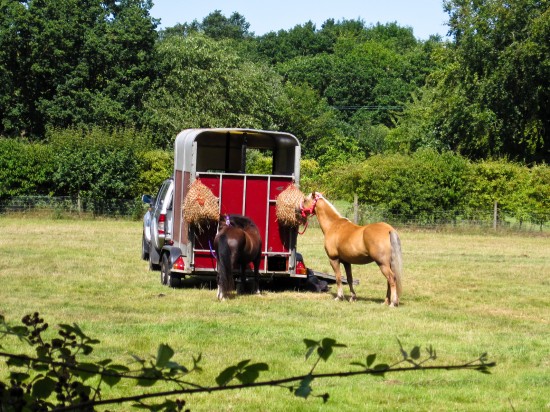I have found that people are not educated enough to make an informed decision when buying a bird cage. That's not good, because if you are buying a decent quality bird cage it isn't going to be cheap, and if you are paying a fair amount, you need to get the best product you can get for your money.
All of this has lead me to creating this article: "7 Things You Need To Know Before Buying A Bird Cage"
1. Is the cage you're considering made of materials that are safe for your bird?
Have you considered the toxicity levels of minerals like Zinc & Lead in the cage you are looking at? This is your #1 priority when shopping for a bird cage. This is the very first question you have to ask! If you can't get a straight answer, then it's time to move on, and this is why some cages are priced so much lower than other cages. All powder-coating on regular powder-coated cages has Zinc and/or Lead in it, but good manufacturers have taken the time to discuss this issue with veterinarians and other bird experts to determine a safe level for both of these minerals and good manufacturers demand that their cages are manufactured in a manner that meets or beats these standards!
2. Is the cage you're considering large enough to keep your bird safe, happy, & healthy?
This is a tricky issue to consider when shopping for a bird cage, but here is the rule of thumb; the bigger the cage the better, as long as the bar spacing isn't too wide. So what is too wide of a bar spacing for your bird? Basically you don't want your bird to be able to put it's head between the bars, because this can cause major injuries or even death to your bird. But you also want to consider that the bigger the cage the better because studies have shown that the larger the cage, the happier & healthier the bird. For a chart that shows you what bar spacing & cage size is appropriate for your species of bird see http://www.bird-supplies.net/size-chart.htm. Please keep in mind that all bird's are different, even bird's of the same species can be significantly different sivzes (for example, a small Conure might fall into the Small Bird Category & a regular-sized Conure would fit into the Medium Bird Category).
3. How easy is the cage to clean?
People tend to overlook this when shopping for a bird cage, but this is arguably the most important factor to consider beyond the toxicity levels in powder-coated cages. Let me tell you why; when a cage is easy to clean it not only cuts down on the amount of time you need to spend on cleaning, it also increases the lifespan of your cage. If your cage is a major pain to clean and it takes multiple hours you will tend to put off cleaning it for longer spans of time and this will drastically shrink the lifespan of your cage (especially a powder-coated cage). Bird droppings can actually become an erosive chemical, and the longer that sits on your cage, the more damage it can do. Even the best of cages will only last 3 or 4 years if not properly cared for. And on the other hand, a properly cared for, good quality powder-coated cage can last over 10 years. So what makes a cage easy to clean? The biggest thing to look for is a cage that is sturdy, but can still be broken down easily in a matter of 1 or 2 minutes without the need for tools. All of the top quality cages have this feature. Even if you don't plan to break your cage all the way down, it's nice to be able to remove a portion of the cage to clean it without having to get out a tool box & spend an afternoon getting that part off & most likely damaging or destroying your cage. Good cages literally snap in & out of place with no tools required! Another great feature to look for is drainage holes in areas where moisture tends to collect, like on the bottom of each panel. This makes it so the moisture drains into the tray rather than sitting on the panel itself and eroding it. You should also shop for cages that have optional-use grates. Here's why this is fairly important; if the grate is "optional to use" that means the bird cannot escape when it's out. Here are two reasons that you may want to remove the grate: 1) Some people think it's a more natural living environment if their bird lives in a cage that has a solid bottom & 2) Nothing gets dirty faster than the bottom grate & if it can be removed and quickly cleaned without creating a gap for your bird to sneak out of this is a very nice feature.
4. Please don't buy a cage to fit into a specific tight spot in your home!
And here is why; when you get caught up with trying to squeeze a cage into a specific spot in your home this tends to take away from the well-being of your feathered friend! Let us explain; birds are a lot like humans, they need space, they need sunlight, they need to be able to look around. I recommend buying a cage with wheels so you can move your bird from time to time and give them a change of scenery (wheels are also a great feature that could be put under the ease of cleaning topic above).
5. Does your cage give your bird enough stimulation?
The two best ways to give your bird stimulation are toy hooks & removable playtops. The reason I am so fond of removable playtops is because they can be pulled off the cage and placed in a spot away from the cage. This is so great for your bird. This not only gives the bird a change of scenery, it also encourages your bird to exercise and it can give your bird a chance to get some sunlight if he is regularly in a room without that.
6. What's the quality-level of the materials used on the cage you are looking at?
Avoid hollow bars at all costs! Any decent sized bird can bend or even chew through a hollow bird cage bar. If you are looking at quality bird cages they will be constructed of steel (the powder-coated cages should be steel underneath the powder-coating & the stainless steel cages should be 100% stainless steel, not plated) or wrought iron. There's no such thing as a flawlessly manufactured bird cage, but there are huge differences in quality levels. Reputable companies will include long-term warranties against manufacturer defects & they will also insure your cage against shipping damages. And since there's no such thing as a flawlessly manufactured cage, you should buy from a company that will back up their product. Don't buy a no-name cage that will come with no manual, no support phone number, and no warranty. A reputable company will jump to make things right in the rare event that you do have a problem.
7. Functional Features & even more attention to detail!
First time bird cage buyers usually aren't the type of people that take features & functionality into account like they should. They've never owned a cage so they don't know what to look for and what to watch out for. Bird cages are the type of item that "you never buy cheap twice". If you buy cheap once, the second time you'll be sure to shop for cages that have features that save you from the nightmares you experienced with your first cage! Here's a feature that's commonly overlooked: bird-proof locks. You need a cage that your bird can't open. Just imagine what could happen to your bird (or your home) if your bird escaped & roamed free the entire time you were out! Here's another functional feature you'll fall in love with; stainless steel bowls that are accessible through external doors. If your bird is a "biter" this is a must-have feature!
And there you have it! You are now more educated about bird cages than 99% of the people out there trying to figure out which one to buy. You are now armed with the knowledge you need to make an educated buying decision!
I urge you to do some additional reading about bird cages at http://www.bird-supplies.net because they have some great articles for your review.
Note: This article can be copied and republished on other websites as long as it stays complete, isn't modified, and the active hyperlinks stay in place.

 8 Breeds Of Dog Prone To Developing Cancer
8 Breeds Of Dog P
8 Breeds Of Dog Prone To Developing Cancer
8 Breeds Of Dog P
 How To Ensure Your Horse Is Happy & Healthy When Travelling
How To Ensure You
How To Ensure Your Horse Is Happy & Healthy When Travelling
How To Ensure You
 Get Rid Cat Hairballs
If you have ever owned a cat, you have noticed on occasi
Get Rid Cat Hairballs
If you have ever owned a cat, you have noticed on occasi
 English Setter Hereditary Health And Longevity
English Setter He
English Setter Hereditary Health And Longevity
English Setter He
 Dogs And Gardens - It Doesn’t Have To Be Difficult!
Dogs And Gardens
Dogs And Gardens - It Doesn’t Have To Be Difficult!
Dogs And Gardens